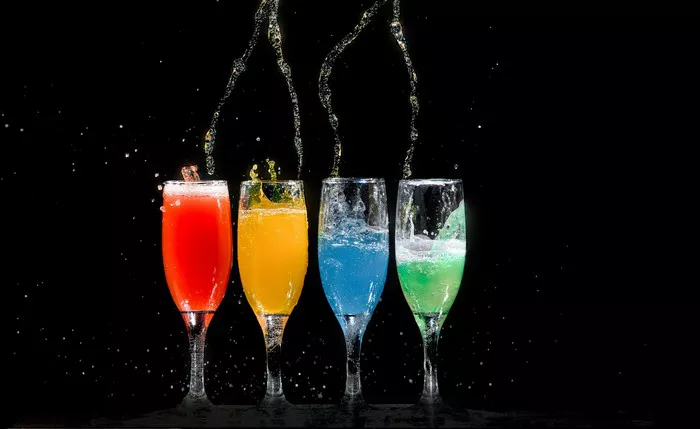The realm of mixology is an intricate blend of science, art, and creativity, where skilled hands craft libations that tantalize the senses and ignite conversations. At the core of every well-crafted cocktail lies a precise balance of ingredients, each contributing its unique flavor, texture, and aroma. Understanding the fundamental components of a cocktail is essential for both aspiring bartenders and enthusiasts alike. In this article, we delve into the five key elements that constitute the backbone of every exceptional cocktail.
1. Spirits: The Foundation of Flavor
What are the 5 components of a cocktail? Spirits undoubtedly claim their place at the forefront. These potent alcoholic beverages form the foundation upon which all cocktails are built. From classic staples like vodka, gin, rum, and whiskey to more niche varieties such as tequila, mezcal, and brandy, the world of spirits offers a diverse array of options for crafting cocktails. Each spirit brings its distinct character to the mix, whether it’s the smooth warmth of aged bourbon or the crisp bite of London dry gin.
In addition to providing alcoholic strength, spirits imbue cocktails with their primary flavor profiles, ranging from floral and herbal notes to smoky and spicy undertones. When selecting spirits for a cocktail, bartenders often consider factors such as base flavor, alcohol content, and intended style of drink. By choosing the right spirit as the cornerstone of a cocktail recipe, mixologists can lay the groundwork for a harmonious blend of flavors that delights the palate.
2. Mixers: Enhancing Complexity and Texture
Mixers play a crucial role in shaping the taste and texture of a cocktail, elevating it from a mere spirit-forward drink to a well-rounded libation bursting with complexity. What are the 5 components of a cocktail without mixers? These non-alcoholic ingredients encompass a wide range of liquids, including juices, sodas, syrups, and vermouths, that complement and enhance the flavors of the base spirit.
From the zesty citrus tang of freshly squeezed lime juice to the subtle sweetness of simple syrup, mixers contribute acidity, sweetness, bitterness, and effervescence to cocktails, balancing out the intensity of the spirits and adding depth to the overall flavor profile. Careful consideration of ratios and proportions is essential when incorporating mixers into cocktail recipes, as they can significantly impact the drink’s taste and mouthfeel. By experimenting with different combinations of mixers, bartenders can craft cocktails that cater to a diverse range of palates and preferences.
3. Bitters and Liqueurs: Infusing Complexity and Depth
Bitters and liqueurs serve as the flavor-enhancing agents in cocktails, imparting depth, complexity, and nuance to the drink. What are the 5 components of a cocktail without these aromatic elixirs? Bitters are concentrated extracts made from botanicals, herbs, spices, and roots, renowned for their potent flavor profiles and digestive properties. From the iconic Angostura bitters to artisanal creations like Peychaud’s and Orange bitters, these aromatic drops add a dash of complexity and balance to cocktails, enhancing their overall character.
Liqueurs, on the other hand, are sweetened spirits infused with various flavors, ranging from fruits and herbs to nuts and spices. Whether it’s the rich, coffee-infused notes of Kahlúa or the vibrant orange essence of triple sec, liqueurs contribute sweetness, depth, and distinct flavor accents to cocktails, rounding out the drink’s profile and creating a harmonious marriage of tastes. By judiciously incorporating bitters and liqueurs into cocktail recipes, bartenders can elevate simple drinks into extraordinary concoctions that leave a lasting impression on the palate.
4. Fresh Ingredients: Purity and Vibrancy
Fresh ingredients are the lifeblood of exceptional cocktails, infusing them with unparalleled purity, vibrancy, and authenticity. What are the 5 components of a cocktail without the essence of freshly squeezed juices, ripe fruits, and aromatic herbs? These natural elements provide a burst of freshness and vitality to cocktails, elevating their flavor profiles and enhancing their visual appeal.
From the bright acidity of lemon and lime juice to the subtle sweetness of muddled berries and herbs, fresh ingredients imbue cocktails with dynamic flavors and aromatic complexity. Bartenders often prioritize the use of seasonal produce and locally sourced ingredients to create cocktails that reflect the terroir and spirit of their surroundings. By embracing the bounty of nature and showcasing the inherent flavors of fresh ingredients, mixologists can craft cocktails that captivate the senses and evoke a sense of connection to the land.
5. Garnishes: A Feast for the Senses
Garnishes serve as the final flourish in the art of cocktail making, transforming ordinary drinks in to visually stunning masterpieces that tantalize the senses. What are the 5 components of a cocktail without the garnishes that adorn them? These decorative accents range from citrus twists and herb sprigs to edible flowers and elaborate ice sculptures, adding flair, aroma, and texture to cocktails while enhancing their overall presentation.
Beyond their aesthetic appeal, garnishes also contribute subtle flavor notes and aromatic accents to cocktails, complementing and amplifying the existing ingredients. Whether it’s the fragrant oils released from a twisted lemon peel or the earthy aroma of fresh mint leaves, garnishes engage the senses and elevate the drinking experience to new heights. Bartenders often experiment with unconventional garnishes and creative presentations to imbue cocktails with a sense of whimsy and intrigue, inviting patrons to savor not only the taste but also the artistry of their libations.
In Conclusion
The art of mixology is a multifaceted journey that revolves around the careful balance and interplay of various components. What are the 5 components of a cocktail? Spirits, mixers, bitters and liqueurs, fresh ingredients, and garnishes each play a pivotal role in shaping the flavor, texture, and overall experience of a cocktail. By mastering the art of cocktail composition and embracing creativity and innovation, bartenders can craft libations that transcend mere drinks and become memorable culinary experiences that linger in the minds and palates of patrons.


